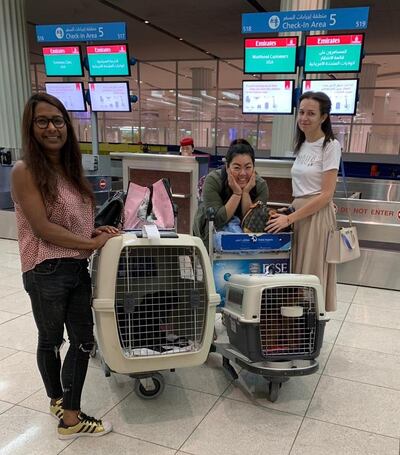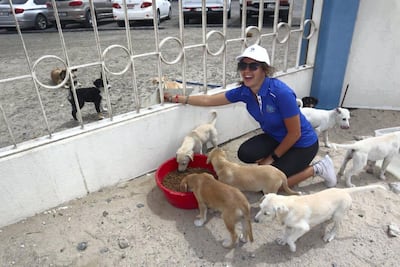Stray and abandoned cats and dogs are the unwitting victims of the rising temperatures across the UAE’s long, hot summer. Many residents may be unwilling or unable to commit to adopting and owning a pet full-time because of career, cash and other constraints, but here are some alternative ways to help animals.
Consider fostering
Fostering is the perfect solution for those who want to help, but are not able to handle a long-term commitment or are unsure whether they would get along with a furry addition to the family. "Fostering is a lifeline for an animal. Many of our animals come from the streets or bad situations and they need a safe, secure place until a forever home is found," explains Tracey Hughes of Rescues of Abu Dhabi.
Agreements on duration are easily made between two parties, with some foster homes required to keep the pet for a predetermined amount of time, and others more flexible. There can be teething issues: for instance, dogs may have gastric issues at first due to nerves, but persevere because this will clear up after a few days. There are many joys to it too, says Sarah Bartlett of Animal Action UAE, who estimates she has fostered more than 100 cats since 2007. “I recommend it. I think it’s a great way to interact with animals – which a lot of us kind of miss in a community where many can be quite transient,” she says.
Be a flight buddy
For animal lovers who enjoy travelling, being a flight buddy is a great option. With homes hard to come by in the UAE, rehoming a pet abroad can be an easier solution. “Being a flight buddy is a simple but rewarding option. You are helping an animal get to their forever home,” says Hughes. There is also no additional cost involved, as the rescue group will cover it.
For those interested, the process is easy. All you need is a plane ticket and passport copy, which will be given to a pet-relocation company or rescuer, and they do the rest of the paperwork required to allow the pet to travel with you. A flight buddy simply needs to have the animal in their care when checking-in at the airport, and be sure to collect them on the way out and hand them over to their new family, who will be waiting at the airport.
“Many airlines will allow animals to go as excess baggage, which is much more cost-effective than sending them as cargo,” Hughes explains. “The animal is added to your ticket and travels with you in the hold. They are then collected on arrival by their families.”
Donate to a licensed animal welfare group
There are many welfare groups in the UAE that have been formed with the hope to better serve animals in need. Emirates Animal Welfare Society is one such licensed non-profit organisation in Abu Dhabi; the rescue organisations that fall under EAWS are Animal Action UAE, 38 Smiles, Kittysnip, Sniff, Rescues of Abu Dhabi, Animal Welfare Al Ain, Animals and Us, and the Red Paw Foundation. Other licensed charities include K9 Friends in Dubai and Stray Dogs Centre UAQ in Umm Al Quwain.
"Cat and dog food donations are very important because [we have to] feed the street animals," Bartlett explains. "A well-fed and healthy animal is less likely to be ill and less likely to be aggressive with the others."
Those who wish to help can also offer monetary donations for veterinary bills or donate old items; towels are always needed, as are litter trays, toys, blankets and travel crates. Most animal-care groups would be more than willing to repurpose such items, while others host garage sales to raise proceeds to help with large vet bills. You can also drop off unwanted pet paraphernalia at such sales.
Sponsor the spaying and neutering of strays
The number of stray animals is almost always higher than the number of homes willing or able to take them in. One way to help reduce the overpopulation is by spaying and neutering. Trap, neuter and return (also known as TNR) is a very popular option in the UAE; there are even charity rates available for street cats at select vets around the country, from Dh110 for males and Dh150 for female animals.
One way to tell if a street cat is already spayed or neutered is to look for a tipped ear. Since most cats have pointy ears, it's easily noticeable if it appears cut, which usually signals that the animal has been sterilised. Dogs are also TNRed when they can be and, while they won't have the ear tip, they will normally have a microchip (which can be checked for free at any vet).
Other than overpopulation, there are some health benefits to spaying and neutering. It reduces the odds of cancers and has behavioural benefits – female animals are less likely to go into heat and male animals are less likely to stray from home; and the overall temperament of a pet can improve.
For those who want to help, but have little experience in trapping an animal on their own, there is the option of sponsoring a TNR treatment through one of the animal-welfare groups listed above.
Volunteer with rescue and welfare groups
Rescue organisations and welfare groups, such as the volunteer-run Animal Action UAE, are always on the lookout for helping hands, whether to fill up feed stations at animal colonies or simply to walk a dog. While the weather in the summer can be difficult to co-ordinate dog walking, it is worth inquiring with rescue organisations if you are still keen on doing so.
“Volunteers’ commitment will truly be tested at this time of year,” says Animal Action UAE’s Mel Stones. “We do ask that if volunteering, they be committed during that time as the dogs and cats truly depend on them. Everyone has busy lives so we understand people can’t give up too much of their time, but they can let us know what they can manage and we can find a role suited to them.”
Sarita Darch, also from Animal Action UAE, mentions that the group feeds about 150 dogs on the street daily and are always looking for people to assist – even if it's just once a week.
Raise awareness
Social media is a powerful tool. Most rescue organisations have Facebook and Instagram accounts, so sharing a post or photo can help bring attention to animals in need of help, or awareness as to when adoption days are being held around the UAE.
Last July, The National covered the story of an Abu Dhabi cat named Gussy after seeing a post about him on The Bin Kitty Collective Facebook group. The feline waited months by a bus stop after being dumped by his owners, never leaving the area, presumably in the hope they would return. The tale won over readers and eventually Gussy was able to find a forever home thanks to enough people sharing his story.
The more eyes on an animal, the more likely it can be helped. Whether it’s sharing a post on Facebook or retweeting a story on Twitter, raising awareness is one more step towards helping. This is one of the brighter sides of social media, where something can go viral with the simple click of a button.
Report abuse
Another important thing to do is speak up on an animal’s behalf by contacting EAWS or another licensed charity organisation, and have them open a case if there is evidence of neglect or abuse.
After a recent report of a dog being shot and killed along with one of her pups, while another dog was wounded at a feeding station, Animal Action UAE was among the first groups to take action in pursuing a criminal case and there is currently an active ongoing police investigation because they spoke up.
Sometimes people are afraid to speak up for fear that they may be inconvenienced or even get into trouble themselves. One tip to help an animal in need is to take a photo or video and report it directly to an animal group or the police, without sharing it on social media.
"Often people are discouraged or too worried to report abuse of animals that they witness, for fear of personal repercussions, [but] the UAE has some of the most stringent animal-welfare legislation in the world," explains Bartlett.
“They are definitely taking animal welfare more seriously, but people have to speak up about it,” adds Darch.




